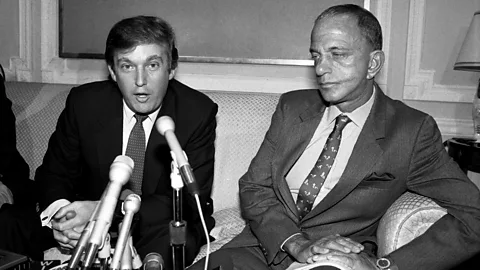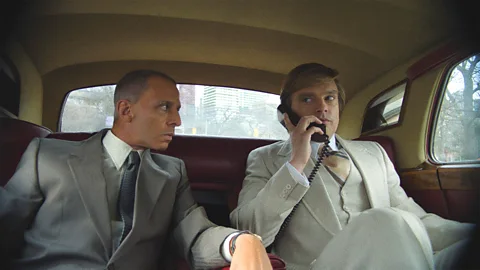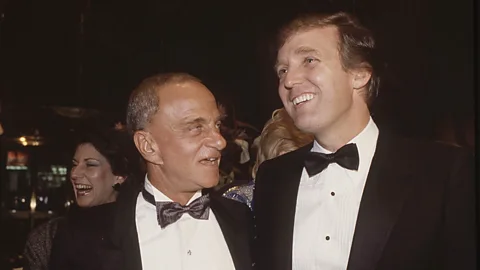Roy Cohn: The mysterious US lawyer who helped Donald Trump rise to power
 Getty Images
Getty ImagesAs new film The Apprentice premieres at the Cannes Film Festival, a look at the cultural afterlife of political hitman Roy Cohn, who was Donald Trump's mentor in his early career – teaching him to "attack, counterattack and never apologise".
The Apprentice, one of the highest-profile films in competition at Cannes, borrows the title of Donald Trump's reality show and turns it upside down. Here the apprentice is Trump himself (Sebastian Stan) as a young businessman being tutored in the ways of power and influence by the unscrupulous lawyer Roy Cohn. Jeremy Strong – the ambitious, cold-blooded Kendall Roy in Succession – plays the mentor, but Kendall would look like a well-behaved pussycat next to the real Roy Cohn.
Cohn is best known now for the lessons he taught Trump, but even before that he was an outsized figure running through US politics and culture. To note his most flagrant hypocrisy, Cohn was a gay man who persecuted other gay people out of their government jobs during what became known as the Lavender Scare of the 1950s. Throughout his life, he bullied people and tried to bully facts. He died of Aids in 1986, insisting publicly that he had liver cancer and denying to the end that he was gay, despite taking his lovers along to public events.
 Cannes Film Festival
Cannes Film FestivalCulturally, he is a furious, menacing character in Tony Kushner's Angels in America and in the recent miniseries Fellow Travelers. He was even the inspiration for Mr Burns' nasty unnamed lawyer on The Simpsons. Esquire magazine reflected the dominant public opinion by noting that Cohn "galloped through the second half of the 20th Century like a malevolent Forrest Gump".
Thomas Mallon, who wrote the 2006 novel Fellow Travelers, the basis for the show, tells the BBC, "One surprise – not evident when I was starting the novel 20 years ago – is that Cohn would have a vampiric afterlife even well beyond something like Angels in America. And of course he owes that to Trump." Cohn does keep coming back from the dead. As Mallon says, "Insofar as he personally affected Trump's thinking and behaviour, one realises that Cohn has had an impact on the republic, albeit at intervals, for 70 years," an astute observation that makes The Apprentice all the more relevant.
Awards Watch
Jeremy Strong is nominated for Best Actor in a ing Role at the Academy Awards for his portrayal of Roy Cohn in The Apprentice. Sebastian Stan also earned his first Oscar nomination in the Best Actor in a Leading Role category for his depiction of President Donald Trump. Both are also up for awards at this year's Baftas. Click here for more on the films getting awards buzz.
Cohn was, in some ways, brilliant. He was barely into his 20s when, as an assistant prosecutor in 1951, he helped engineer the conviction and execution of Julius and Ethel Rosenberg as Soviet spies, and acknowledged using illicit, back-channel conversations with the judge to get the death penalty. Soon after, he became notorious as chief counsel for Senator Joseph McCarthy's committee rooting out Communists and supposed Communists from the government.
In New York during the 1970s and 80s, he partied at the drug-fuelled nightclub Studio 54, and wielded influence as a friend of the famous and powerful, including Barbara Walters, Andy Warhol and Ronald and Nancy Reagan. As a lawyer, he represented clients from Mafia bosses to Trump, and weeks before he died was disbarred for, among several offences, defrauding other clients. He was also well known for his habit of eating off other people's plates, uninvited, even in the poshest restaurants. (Narcissism or just gross table manners? Probably both.)
 Getty Images
Getty ImagesHis alliance with Trump began in the early 1970s when the US government sued Trump and his father for discriminating against black renters in apartments they managed. Cohn had Trump countersue the Justice Department. The case was settled, and started a litigious pattern that helped define Trump's career in business and later politics. A Washington Post article about Cohn's influence, published during the 2016 presidential campaign, had the headline "The man who showed Donald Trump how to exploit power and instill fear", and summed up his lesson as "a simple formula: attack, counterattack and never apologise". Cohn was also expert at media manipulation.
The historical Cohn is on display in the 2019 documentary Where's my Roy Cohn? Although not focused on Trump, the film takes its title from one of his now-famous comments. When Attorney General Jeff Sessions recused himself from an investigation into Russian interference in the 2016 election – a decision Trump saw as disloyal – he reportedly asked in anger "Where's my Roy Cohn">window._taboola = window._taboola || []; _taboola.push({ mode: 'alternating-thumbnails-a', container: 'taboola-below-article', placement: 'Below Article', target_type: 'mix' });
